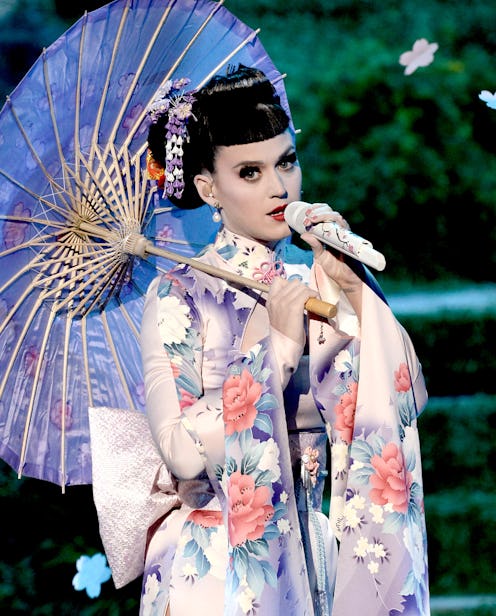In a new interview with GQ, Katy Perry speaks a little about the Geisha-themed performance of "Unconditionally" heard 'round the world, and while the interview took place before the performance was declared racist, it's clear that Perry's ignorance is deeper than we'd hoped.
Speaking with reporter Amy Wallace minutes before the now infamous romp, Perry explains why she's decided to perform in semi-traditional Geisha clothing. "I was thinking about unconditional love, and I was thinking: Geishas are basically, like, the masters of loving unconditionally." Wallace points out the irony in this statement to readers, because of course, Geisha's "love" was completely conditional -- in the past, Geisha were sometimes paid as sexual companions for wealthy men, and often their virginity was offered up to patrons as part of a ritual. It doesn't get any more conditional than that.
While the contemporary Geisha denotes a woman dedicated to arts such and dancing, tea, and conversation, the "love" Perry speaks of is nonexistent. In present day, Geisha are still the symbol of the "perfect Japanese woman," present to speak beautifully and wear beautiful clothes. And to be fair, Perry notes after the backlash hits that she was putting on "a very beautiful performance about a place that I have so much love for and find so much beauty in" and technically, Geisha are symbols of beauty now, but hers is still a rather superficial understanding of culture.
Perry solidifies this when she calls Japan “the capital of adorableness” according to GQ, reducing an entire nation to Hello Kitty curios and the cat cafe she loves so dearly. Sure, many adorable consumer goods come out of Japan, but her callous deduction of the entire country as the main exporter of "adorable" hamburger-shaped compact mirrors is myopic and condescending and makes it clear that Perry had no hope of coming out of this performance without offending someone.
What's stranger still is that clearly, Perry had to explain her process to numerous people in order to get this performance off the ground. She had to say to teams of production people and money people that Geisha are a symbol of "unconditional love" and she had to express that her obsession with Japan comes not from its rich history of arts or literature, but from all the "cute" things she associates with the nation. Perry voiced this and no one, at any moment, said that perhaps this concept was a bit of a culture theft or that it felt a little racist — if they had, there's no way it would have made it to the stage on national television.
The one good thing about all of this — if there even is a good thing — is that Perry clearly thought she was being complimentary to Japanese culture. The problem is that while she may have the means to travel across the globe to actually visit Japan, she never actually bothered to learn anything about it.
And understandably, pop stars are prized for their ability to entertain and not their ability to pass a history exam, but is it so much to ask that if a celebrity is given carte blanche to create that they be required to actually study the real life concepts they hope to borrow from? Would it have been so hard to direct Perry towards even the Wikipedia page before she sat down with designers and put together a set that turned a famous Japanese painting into the empty background for a performance that was largely a hodge podge of "stuff we heard was Japanese?"
Sure, pop stars can largely do whatever they want and still retain a rabid fan base (just ask any totally real and still active Belieber), but do we need to give them so much power that their ignorance is not only deemed "OK," but literally propped up on stilts and draped in elaborate costumes?
Let Perry be the straw that broke us: let us demand at least a little more from celebs. Even if it's just the hope that they know how to open up something as simple as Wikipedia on their iPhones.
